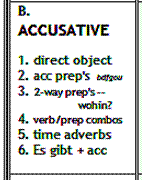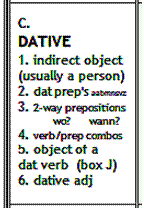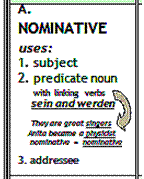|
Codes for correcting grammar and word choice mistakes in essays |
|
|
When I type this code into a student's email: |
This message is inserted into their essay:
|
|
2n |
●
What’s the correct secondary
adjective ending here?
e e
e n
n
e e
n
n
n n
n
n
n n
n |
|
ac |
●
Why is this in the ACCUSATIVE CASE? Choose one:
|
|
agr |
● Does your verb AGREE
with your SUBJECT?
|
|
askm |
● ask me in class
|
|
ax |
● Is the auxiliary verb here HABEN or SEIN?
HINT: If the verb connotes TRAVEL or state of BEING, the
auxiliary is often a form of SEIN (bin, bist, ist, sind, seid.
Otherwise a form of haben.)
Check out
VERBIX
to be sure.
|
|
bw |
●
BEKOMMEN
means to RECEIVE something,
WERDEN
means TO BECOME or indicates FUTURE tense = Wir werden
tanzen. |
|
ch |
m
n
f
pl
NOM
Ø
re
Ø se
e
e
e
n
ACC
n
n
Ø
se
e
e
e
n
DAT
m
n
m
n
r
n
n
n+ noun-n
GEN
s
n+
s
n+s
r
n
r
n |
|
cmp |
● What is the
COMPARATIVE FORM for this adverb or adjective?
Hint: German
never uses the word mehr for the comparative! |
|
cn |
● A comma always
separates two clauses:
SV,
SV.
|
|
cnj |
● Choose a different
conjunction! |
|
cp |
● What about
CAPITALIZATION here? |
|
cs |
● What should this CASE
be? Why?
|
|
cwr |
● Isn't the comma in
the wrong place here? |
|
czu |
● A comma precedes a
zu-clause, right? |
|
dfpr |
● This PREPOSITION
doesn't quite work here.
Can you choose a different one? |
|
dssds |
● dass
is a subordinating conjunction preceded by a comma, das is an
article meaning THE (das
Auto) or it is used as
a pronoun (Das
weiß ich!) |
|
dt |
● Why is this in the DATIVE CASE? Which one of the six
uses
|
|
dtpl |
● What is the ending
for all nouns in the dative
plural?
n,
right? |
|
duw |
● please use DU for
students your age
|
|
dw |
● There is
a BETTER WORD for this idea.
try
http://www.dict.cc/
or
http://www.linguee.com/english-german
|
|
eng |
● This sounds
like an English idiom.
Try it again, using a more German expression. |
|
ew |
● Don't you need
a form of EIN here? |
|
fm |
● Shouldn’t this be
feminine? Please check
you genders!
|
|
fut |
● How do you form the
future tense?
Hint: form of WERDEN plus the INFINITIVE. |
|
gdr |
●
What is the GENDER of this
noun?
HTTP://WWW.DICT.CC/
makes it easy to check all your genders –
always open it before you
start writing!
|
|
gn |
● Why is the GENITIVE
CASE needed here?
Choose one:
1. shows
POSSESSION -- das Haus meines Vaters
2. GENITIVE
PREPOSITION (statt, trotz, während, wegen) -- wegen des Wetters
3. INDEFINITE TIME --
eines Tages. |
|
gnd |
● What is the GENDER of
this noun?
HTTP://WWW.DICT.CC/
makes it easy to check all your genders –
always open it before you
start writing!
|
|
ib |
●
(inserts a bullet for teacher comment)
|
|
ij |
● indicate a year with
NO preposition or :
im Jahre 2012 |
|
imp |
● What is the correct
form of the IMPERATIVE here?
no ending?
t ending?
Sie plus
-en ending? |
|
inf |
● Why is the INFINITIVE
needed here? |
|
mnac |
● MAN goes to EINEN in
the accusative and EINEM in the dative, right? |
|
mnmn |
● MAN stays MAN instead
of going to ER |
|
mnnmn |
●
der Mann means man or
husband;
man (no capitalization,
no article, no double n ) means one |
|
mw |
●
missing word, right?
|
|
mz |
● you do not need the word ZU after a modal verb (können, dürfen,
müssen, sollen, wollen, möchten) |
|
nc |
● you do not need the word ZU after a modal verb (können, dürfen,
müssen, sollen, wollen, möchten)
|
|
ne |
● German don't
use the expression NICHT EIN do they?
Try a form of KEIN. |
|
nm |
●
Why is this in the NOMINATIVE CASE? Which one of the three
uses?
|
|
ns |
● this is not a
sentence – add a bit more! |
|
omt |
● You can OMIT this
word, right? |
|
ow |
● Make this one word instead of two |
|
pl |
● What is the correct
PLURAL of this noun? |
|
pu |
● What is the correct
PUNCTUATION here? |
|
pp |
● What is the
correct PAST PARTICIPLE here?
Do you have your list of past participles handy whenever you
write?
http://www.dict.cc/
also gives principle parts – open it now! |
|
pr |
● Use a
primary (strong, gendered) ending here!
Please memorize the chart:
der das die die
den das die die
dem dem der den
des des der der |
|
pr |
● PRONOUNS come early
in the sentence, right? |
|
prp |
● Please insert a preposition!
|
|
ps |
● The passive voice uses a form of WERDEN plus the past participle.
|
|
pss |
● Past
subjunctive = form of hätte
or wäre plus the past
participle.
|
|
pt |
● What is the correct
PAST TENSE form of this verb?
If the verb is strong, you need to look it up. If it is weak,
you will use -TE as all or part of the ending!
http://www.dict.cc/
gives principle parts – open it now!
|
|
rcl |
● Your RELATIVE
PRONOUN here acts like a SUBORDINATING CONJUNCTION:
COMMA comes right before it.... the VERB goes LAST.
|
|
rfpr |
● Use a REFLEXIVE
PRONOUN with this verb.
(The dictionary will say
sich)
mich/mir
uns
dich/dir
euch
sich
sich sich
|
|
rlpr |
● What is the correct
form of the RELATIVE PRONOUN here?
GENDER (look for the NOUN it refers back to) …
CASE (how does the pronoun function in its own clause?)
der
das
die
die
den
das
die
die
dem
dem
der
denen
dessen dessen
deren
deren
|
|
sbcn |
● What is the
correct SUBORDINATING CONJUNCTION here?
|
|
sbj |
● What is the correct
form of the SUBJUNCTIVE here?
Try looking up the SUNJUNCTIVE mood in a good grammar book!
|
|
sim |
● Can you rewrite or
simplify this idea to make it easier to understand?
|
|
sn |
● Can you create
a complete sentence? |
|
sp |
● Check the
spelling of this word!
You can simply type it into Google and Google will often guess the
right spelling!
|
|
spr |
● What is the
correct form of the SUPERLATIVE here?
google this:
German superlative
http://www.dict.cc/
also gives comparative and superlative forms – use it!
|
|
stry |
● Past perfect,
PAST TENSE, and conditional (würde) fit together --
and are often used to tell a story. |
|
sv, stv |
● Isn't this a
STRONG VERB?
Check the verb forms here:
http://www.verbix.com/languages/german.shtml
Here is a o good
list:
http://www.vistawide.com/german/grammar/strong_and_irregular_german_verbs.htm
|
|
ßlg |
● Use "ß"
after LONG VOWELS -- stoßen ... weiß ...
|
|
ti |
● Tolle Idee.
|
|
tm |
● Don't TIME ADVERBS
come early in the sentence?
Try the PREFIELD or right after the VERB |
|
tn |
● What TENSE
should this be?
|
|
tns |
● What TENSE
should this be?
|
|
tt |
● please break this
complex sentence into two or three shorter sentences.
It will help your reader understand what you are trying to
say.
|
|
tw |
● You need a THE
word, right?
|
|
undr |
● I don't quite understand what you are trying to say
|
|
v2 |
● Isn’t the inflected verb
always the second element in normal word order?
|
|
vb |
● Check the verb
forms here:
http://www.verbix.com/languages/german.shtml
|
|
vl |
● Put this verb last!
Why?
|
|
vv |
●
viel
is singular,
viele
is plural
|
|
wd |
● There is
a BETTER WORD for this idea.
try
http://www.dict.cc/
or
http://www.linguee.com/english-german
|
|
wh |
● Here are the options
for answering
W O H I N
ZU
usually used with persons and buildings
zu Anna --- zur Bibliothek -- zur Schule -- zum Supermarkt -- zu
meiner Oma
NACH
with cities and most countries -- and going home
nach St. Joe -- nach Österreich -- nach München -- nach Salzburg --
nach Hause
IN
is used frequently for buildings a some countries
in den Wald -- in die
Kirche -- in die Schweiz -- in die Vereinigten Staaten -- in die
Türkei
|
|
wm |
● This is a weak
masculine noun. What
ending does it get in acc, dat and gen?
|
|
wn |
●
Wunderbar. Keine Fehler.
|
|
wo |
● take a look at word order.
|
|
wv |
● Isn't this a
WEAK verb?
here is the pattern:
lieben, liebte, hat geliebt
Isn't the
simple past tense
ending always
-te
f or WEAK VERBS?
For the
PRESENT PERFECT TENSE,
doesn't the
past participle
end in
–t
? check out
http://www.dict.cc/
Check all verb forms here:
http://www.verbix.com/languages/german.shtml |
|
wwa |
●
wenn
means if and when,
wann
is a question word,
als
mean when and is used only with the
past tense (Als ich 15
war,…)
|
|
ze |
● ein words have NO
ending in MASC NOMINATIVE
ein
words have NO ending in NEUTER NOM or ACC!
mein
mein
meine meine
meinen
mein
meine
meine
mienem
meinem
meiner meinen
meines
meines
meiner
meiner
Here are all the words that follow this pattern:
mein, dein, sein, ihr,
unser, euer, ihr, Ihr, ein, kein |


